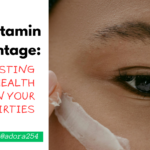Feeling drained and irritable all the time? Mood swings and fatigue can really get in the way of your life. They affect how you feel and do things every day. Some nutrients are very important for keeping your mood and body healthy.

Studies have found that certain vitamins can really help with mood swings and feeling tired. Adding these important nutrients to your meals can help you feel better and more balanced.
Key Takeaways
- Certain vitamins can alleviate mood swings and fatigue.
- A well-balanced diet rich in essential nutrients is crucial for emotional and physical health.
- Incorporating specific vitamins can help regain energy and emotional balance.
- A healthy diet is a key factor in managing mood swings and fatigue.
- Understanding the role of vitamins can empower you to make informed dietary choices.
The Vital Link Between Nutrition and Mental Wellbeing
Nutrition is key to our mental health, affecting our mood and energy. The food we eat gives our body what it needs to make important chemicals. These chemicals help control our mood and energy levels. Eating a balanced diet is essential for good mental health.
How Vitamin Deficiencies Manifest as Mood Issues
Vitamin shortages can really affect our mental state, causing mood swings and depression. For example, not enough vitamin B12 can make us tired and weak. Also, not enough vitamin D can lead to depression and seasonal affective disorder. It’s important to get enough vitamins through food or mood support supplements to stay emotionally balanced.
The Biochemistry of Energy Production and Emotional Balance
The process of making energy in our bodies is complex. It involves many nutrients, like vitamins and minerals. Energy boosting vitamins like B vitamins help turn food into energy. Magnesium and iron are also key for healthy neurons and neurotransmitters. Without enough of these, we can feel tired and our mood can suffer.
Vitamins That Help With Mood Swings and Fatigue: A Comprehensive Guide
The right vitamins can help stabilize your mood and energy. It’s important to know which vitamins are key for mental health. They affect how our brains work, helping us manage mood swings and fatigue.
Understanding Micronutrients and Brain Function
Micronutrients, like vitamins and minerals, are crucial for brain health. They help control mood and energy. Vitamin B complex, vitamin D, and iron are especially important. They help make neurotransmitters and produce energy.
Vitamin B6 helps make serotonin, which affects mood. Getting enough of these nutrients can help with mood swings and fatigue.
Signs Your Mood Issues May Be Nutrition-Related
Feeling tired, having trouble concentrating, or being irritable could be due to what you eat. Look out for unexplained tiredness, difficulty concentrating, and mood disturbances.
| Symptom | Possible Nutrient Deficiency |
|---|---|
| Fatigue | Iron, Vitamin B12 |
| Mood Swings | Vitamin D, Omega-3 Fatty Acids |
| Irritability | Magnesium, Vitamin B6 |

Understanding the connection between nutrients and brain function is a big step. Getting the best vitamins for energy and mood can greatly improve your health.
Vitamin D: The Sunshine Nutrient for Depression Relief
Research shows Vitamin D deficiency is linked to depression and seasonal affective disorder. Vitamin D is key in regulating mood and lowering depression risk. Understanding its benefits and how it works is crucial for mood improvement.
Vitamin D receptors are found in mood-regulating brain areas. Vitamin D’s impact on neurotransmitters and neuroprotection is being studied. It may affect serotonin levels and brain health.
How Vitamin D Regulates Mood Pathways
Vitamin D affects mood by influencing neurotransmitter and neuron function genes. It’s thought to help with serotonin production, a mood-regulating neurotransmitter.
Sunlight Exposure vs. Supplementation
Sunlight is a natural Vitamin D source, but supplements are often needed, especially in winter. Balancing sunlight exposure with supplementation is key for optimal Vitamin D levels.
| Source | Benefits | Limitations |
|---|---|---|
| Sunlight Exposure | Natural source, free, and easily accessible | Limited during winter, varies by skin tone and location |
| Supplementation | Consistent dosing, available year-round | Quality varies by product, potential for overdose |
Optimal Dosing for Mood Enhancement
The best Vitamin D dose for mood is still being researched. Most studies suggest 30-50 ng/mL is good for health and mood. Always talk to a healthcare professional about the right dose for you.

B12: Combat Fatigue and Boost Mental Clarity
Vitamin B12 is a natural mood enhancer that helps with energy and nerve function. It’s key for making red blood cells and keeping the nervous system healthy. Having enough Vitamin B12 can greatly improve your energy and mental focus.
B12’s Role in Energy Metabolism and Nerve Function
Vitamin B12 helps turn fatty acids and amino acids into energy. It also helps make myelin, the fatty stuff around nerves, which helps them work better. Without enough B12, you might feel tired, weak, and have nerve problems.

Animal vs. Plant Sources of B12
Animal products like meat, fish, eggs, and dairy have lots of Vitamin B12. Vegans find it hard to get enough from plants alone. But, some plant foods are fortified with B12, and supplements are an option too.
| Food Source | Vitamin B12 Content |
|---|---|
| Beef Liver | High |
| Salmon | High |
| Eggs | Moderate |
| Fortified Plant Milk | Varies |
Sublingual vs. Oral vs. Injectable Forms
Vitamin B12 supplements come in different forms like tablets, drops, and injectables. Drops are placed under the tongue for quick absorption. Tablets are swallowed and absorbed in the gut. Injectables are given directly into muscles or veins, usually for severe deficiency.
Each type has its own benefits. Talking to a doctor can help find the right one for you.
Vitamin B6: The Mood-Stabilizing B Vitamin
Vitamin B6 is key for making neurotransmitters that control your mood. It helps your body make serotonin, dopamine, and other important neurotransmitters. These help keep your mood healthy.

How B6 Creates Serotonin and Other Neurotransmitters
Vitamin B6 helps make serotonin, a key neurotransmitter for mood. It helps lower the risk of depression and anxiety. Adequate B6 levels mean your body can make enough serotonin. This supports emotional balance.
Food Sources Rich in Bioavailable B6
Eat foods high in Vitamin B6 to keep your levels right. Good sources are chicken, fish, potatoes, chickpeas, bananas, and fortified cereals. A balanced diet with these foods supports your emotional health.
Warning Signs of B6 Deficiency and Excess
Too little or too much Vitamin B6 can cause problems. Deficiency might lead to irritability, depression, and tiredness. Too much can cause neurological issues. Knowing these signs is important. If you’re thinking about Vitamin B6 supplements, talk to a healthcare expert. They can help you find the right amount for your supplements for emotional well-being plan.
Folate (B9): Essential for Emotional Resilience
Folate is key in fighting depression and fatigue. It helps with DNA repair and cell growth. It also boosts mood and emotional health.

The Folate-Depression Connection Explained
Folate helps make neurotransmitters like serotonin and dopamine. These chemicals control our mood. Without enough folate, we might feel sad or depressed.
Research shows people with depression often lack folate. This shows how important folate is for our mental health.
MTHFR Gene Mutations and Folate Metabolism
The MTHFR gene turns folate into methylfolate. But, if the gene mutates, this process fails. This can lead to high homocysteine levels and less methylfolate for our brain.
Methylfolate: The Superior Form for Mood Support
Methylfolate is the active form of folate. It doesn’t need the MTHFR enzyme to work. Taking methylfolate can help mood and emotional strength, even with MTHFR gene issues.
| Folate Form | Conversion Requirement | Effectiveness in Mood Support |
|---|---|---|
| Folic Acid | Requires conversion via MTHFR | Variable, dependent on MTHFR efficiency |
| Methylfolate | No conversion required | High, directly supports neurotransmitter synthesis |
Vitamin C: Stress Relief and Energy Enhancement
Vitamin C is a great help for mood swings and fatigue. It helps control cortisol levels and boosts adrenal function. This is key for managing stress and keeping you feeling good.

Vitamin C is not just an antioxidant. It’s also important for stress relief and boosting energy. It helps control cortisol, the stress hormone, and supports your adrenal function.
Regulating Cortisol and Adrenal Function
Vitamin C is vital for managing cortisol levels. This helps reduce stress’s impact on your body. It also supports adrenal function, keeping your energy steady, even when stressed.
- Reduces oxidative stress: Vitamin C’s antioxidant properties help in reducing oxidative stress, which can contribute to fatigue.
- Supports adrenal health: By supporting adrenal function, Vitamin C helps in maintaining your energy levels.
Liposomal vs. Traditional Vitamin C Supplements
The type of Vitamin C supplement you choose matters. Liposomal Vitamin C has better bioavailability than traditional ones.
Liposomal Vitamin C uses liposomes to improve absorption. This means more Vitamin C in your blood. This could lead to better stress relief and energy.
Combining Vitamin C with Other Nutrients
Vitamin C is good on its own, but better with other nutrients. For example, adding mood stabilizing supplements like Magnesium boosts its stress-relieving effects.
Some good combinations are:
- Vitamin C + Magnesium: Enhances stress relief and supports adrenal function.
- Vitamin C + B Vitamins: Supports energy production and can help alleviate fatigue.
Knowing how Vitamin C works and how to mix it with other nutrients helps. This can lead to better mood and less fatigue.
Magnesium: Nature’s Tranquilizer for Mood Stability
You might not know that magnesium is key for mood and energy. This mineral helps with many body processes that affect your feelings. Getting enough magnesium is important for managing mood swings and tiredness.

Magnesium does many things in the body, like helping muscles and nerves. It’s especially important for mood, as it helps with neurotransmitters and the nervous system.
Magnesium’s Critical Role in Over 300 Biochemical Reactions
Magnesium is needed for over 300 body reactions, like energy and neurotransmitters. It helps control stress hormones and keeps the nervous system healthy. A lack of magnesium can cause stress, anxiety, and mood problems. It’s key for emotional balance.
Comparing Magnesium Glycinate, Threonate, and Other Forms
There are different magnesium types, each with its own benefits. Magnesium glycinate is easy on the stomach and well absorbed. Magnesium threonate can get into the brain, helping with thinking and mood. Choosing the right magnesium depends on your needs and goals.
Topical vs. Oral Magnesium for Mood Benefits
Topical and oral magnesium have their own advantages. Oral supplements give magnesium over time. Topical like Epsom baths or creams work fast for muscles and stress. Using both might give the best mood and health benefits.
Omega-3 Fatty Acids: Essential Fats for Brain Health
Omega-3 fatty acids are key nutrients for your brain. They help with thinking and feeling good. Adding them to your diet can boost your mood and brain health.
These fats, especially EPA and DHA, are vital for your brain. They help manage mood and might ease depression symptoms.
EPA vs. DHA: Which Is Better for Mood Regulation
EPA and DHA are both important for health. EPA fights inflammation, which can improve mood. DHA is key for brain structure and function.
Fish Oil, Krill Oil, and Algae-Based Supplements Compared
There are many Omega-3 supplements to choose from. Here’s a quick look at fish oil, krill oil, and algae-based options:
| Supplement Type | Source | Key Benefits |
|---|---|---|
| Fish Oil | Fatty fish | High EPA and DHA content |
| Krill Oil | Krill | Contains phospholipids for better absorption |
| Algae-Based | Algae | Vegetarian/vegan-friendly, rich in DHA |
Each supplement has its benefits. The right choice depends on your diet and needs.
Determining Your Optimal Omega-3 to Omega-6 Ratio
It’s important to balance Omega-3 and Omega-6 fatty acids. Most Western diets have too much Omega-6, causing inflammation and mood issues. Eating more Omega-3s can help balance this.
Iron: Combating Fatigue and Mood Disturbances
Iron is key for your body, lacking it can cause tiredness and mood swings. It helps make hemoglobin, a protein in red blood cells. This protein carries oxygen from your lungs to your body.
Without enough iron, your body can’t make enough healthy red blood cells. This leads to feeling tired and having mood issues.

The Connection Between Iron Deficiency and Exhaustion
Iron deficiency is common worldwide, affecting millions. Exhaustion is a key symptom of iron deficiency anemia. Your body’s cells don’t get enough oxygen to make energy.
If you’re always tired, it’s important to check your iron levels.
Heme vs. Non-Heme Iron Sources
There are two types of dietary iron: heme and non-heme. Heme iron is in animal products like red meat, poultry, and fish. It’s easier for your body to absorb than non-heme iron.
Non-heme iron is in plant-based foods like beans, lentils, and fortified cereals. To better absorb non-heme iron, eat it with foods high in vitamin C.
Safe Supplementation Practices for Iron
If you have iron deficiency, you might need supplements. But, it’s important to follow safe supplementation practices to avoid too much iron. Always talk to a healthcare professional to find the right dose for you.
Be aware of possible side effects like stomach upset.
Zinc: The Mineral That Regulates Emotional Response
Zinc is key for emotional balance and handling stress. It affects neurotransmitters and brain health. This mineral is vital for mood and emotional well-being.
Zinc helps the immune system and aids in healing. It’s also important for making proteins and cells. Zinc is part of enzymes and proteins needed for brain function and making neurotransmitters.
Zinc’s Impact on Neurotransmitter Systems
Zinc affects neurotransmitters like serotonin and dopamine. These are linked to mood and emotional responses. Adequate zinc is needed for these systems to work right.

Food Sources and Absorption Enhancers
You can get zinc from red meat, poultry, seafood, beans, and nuts. Oysters are especially rich in zinc. Eating foods high in vitamin C with zinc can help your body absorb it better.
| Food Source | Zinc Content (mg per serving) |
|---|---|
| Oysters | 76.7 |
| Beef | 7.0 |
| Chicken | 2.4 |
| Pumpkin Seeds | 2.2 |
| Cashews | 1.6 |
Balancing Zinc and Copper for Optimal Mood
Zinc and copper must be balanced for good mood and emotional health. Both are important, but too much of one can be bad. Keeping zinc and copper levels balanced is crucial for brain health and neurotransmitter function. Adjusting your diet or using supplements can help find this balance.
Conclusion: Creating Your Personalized Vitamin Protocol for Emotional Wellness
Now that you know the key vitamins and minerals for better mood and energy, it’s time to make a plan. Create a vitamin protocol that fits your needs. This way, you can actively support your emotional health.
Start by looking at the nutrients we talked about, like Vitamin D, B12, and Omega-3 fatty acids. Check your diet to see where you might be missing out. Then, talk to a healthcare expert to figure out the best supplements for you.
Choosing the right nutrients and supplements can help you handle mood swings and fatigue. This leads to a more balanced and happy life. Begin your journey to better emotional health by making a vitamin plan that suits you.
FAQ
What are the best vitamins for energy and mood?
Vitamins like Vitamin D, B12, B6, and Folate (B9) are key for energy and mood. Vitamin C, Magnesium, and Omega-3 fatty acids also boost emotional health and fight fatigue.
How do I know if my mood issues are related to nutritional deficiencies?
Look out for signs like constant tiredness, mood swings, and irritability. Talking to a healthcare pro can reveal if diet is a factor.
Can Vitamin D supplements help with depression?
Yes, Vitamin D can improve mood and help with depression. But, always talk to a doctor about the right dose for you.
What is the difference between EPA and DHA Omega-3 fatty acids?
EPA and DHA are both good for the brain. EPA helps with mood, while DHA is important for brain structure. A mix of both in supplements is best.
How can I ensure I’m getting enough Magnesium for mood stability?
Eat foods like dark greens, nuts, and seeds for Magnesium. Or, take supplements like Magnesium Glycinate or Threonate. Applying Magnesium topically can also work.
Are there any risks associated with taking multiple supplements for mood support?
Yes, mixing many supplements can lead to bad interactions or too much of some nutrients. Always get advice from a healthcare pro for a safe plan.
Can iron deficiency cause mood disturbances?
Yes, not enough iron can cause tiredness, mood swings, and irritability. Getting enough iron through food or supplements can help.
How do I balance Zinc and Copper for optimal mood?
It’s important to keep Zinc and Copper in balance. Too much Zinc can cause Copper deficiency, and vice versa. A healthcare pro can help find the right balance for you.





**mindvault**
mindvault is a premium cognitive support formula created for adults 45+. It’s thoughtfully designed to help maintain clear thinking
**sugarmute**
sugarmute is a science-guided nutritional supplement created to help maintain balanced blood sugar while supporting steady energy and mental clarity.
**glpro**
glpro is a natural dietary supplement designed to promote balanced blood sugar levels and curb sugar cravings.
**vitta burn**
vitta burn is a liquid dietary supplement formulated to support healthy weight reduction by increasing metabolic rate, reducing hunger, and promoting fat loss.
**prodentim**
prodentim an advanced probiotic formulation designed to support exceptional oral hygiene while fortifying teeth and gums.
**glucore**
glucore is a nutritional supplement that is given to patients daily to assist in maintaining healthy blood sugar and metabolic rates.
**synaptigen**
synaptigen is a next-generation brain support supplement that blends natural nootropics, adaptogens
**sleeplean**
sleeplean is a US-trusted, naturally focused nighttime support formula that helps your body burn fat while you rest.
**nitric boost**
nitric boost is a dietary formula crafted to enhance vitality and promote overall well-being.
**prostadine**
prostadine is a next-generation prostate support formula designed to help maintain, restore, and enhance optimal male prostate performance.
**wildgut**
wildgutis a precision-crafted nutritional blend designed to nurture your dog’s digestive tract.
**mitolyn**
mitolyn a nature-inspired supplement crafted to elevate metabolic activity and support sustainable weight management.
**zencortex**
zencortex contains only the natural ingredients that are effective in supporting incredible hearing naturally.
**yu sleep**
yusleep is a gentle, nano-enhanced nightly blend designed to help you drift off quickly, stay asleep longer, and wake feeling clear.
**breathe**
breathe is a plant-powered tincture crafted to promote lung performance and enhance your breathing quality.
**pineal xt**
pinealxt is a revolutionary supplement that promotes proper pineal gland function and energy levels to support healthy body function.
**energeia**
energeia is the first and only recipe that targets the root cause of stubborn belly fat and Deadly visceral fat.
**prostabliss**
prostabliss is a carefully developed dietary formula aimed at nurturing prostate vitality and improving urinary comfort.
**boostaro**
boostaro is a specially crafted dietary supplement for men who want to elevate their overall health and vitality.
**potent stream**
potent stream is engineered to promote prostate well-being by counteracting the residue that can build up from hard-water minerals within the urinary tract.
**hepatoburn**
hepatoburn is a premium nutritional formula designed to enhance liver function, boost metabolism, and support natural fat breakdown.
**hepato burn**
hepato burn is a potent, plant-based formula created to promote optimal liver performance and naturally stimulate fat-burning mechanisms.
**flow force max**
flow force max delivers a forward-thinking, plant-focused way to support prostate health—while also helping maintain everyday energy, libido, and overall vitality.
**prodentim**
prodentim is a forward-thinking oral wellness blend crafted to nurture and maintain a balanced mouth microbiome.
**neuro genica**
neuro genica is a dietary supplement formulated to support nerve health and ease discomfort associated with neuropathy.
**cellufend**
cellufend is a natural supplement developed to support balanced blood sugar levels through a blend of botanical extracts and essential nutrients.
**revitag**
revitag is a daily skin-support formula created to promote a healthy complexion and visibly diminish the appearance of skin tags.
ffrm78
Great post. I am facing a couple of these problems.
Downloaded the bet917app and it’s surprisingly smooth. Works a treat on my phone. Everything you need in your pocket, right? Get it here: bet917app
Diwataplaylogin gets you straight in. Not bad if you want no fuss, just games. Login easily at diwataplaylogin
Thank you for your sharing. I am worried that I lack creative ideas. It is your article that makes me full of hope. Thank you. But, I have a question, can you help me?
Alright, poker faces, listen up! TaiPokerKing.net is where it’s at if you’re serious about your poker game. Lots of different tables and levels to choose from. Just be careful, those sharks are hungry! See for yourself at pokerking
Your point of view caught my eye and was very interesting. Thanks. I have a question for you.
Your article helped me a lot, is there any more related content? Thanks!
bk8casino https://www.bk8casinovs.com
pn777 https://www.lapn777.net
Hey folks! SAO668WIN has a surprisingly good setup. I played a few rounds and enjoyed the experience. Signup was quick and navigating the site was a breeze. Check out sao668win, maybe you’ll get lucky.
Alright, so I took a gamble on 77bdbet. It’s alright. Some unique games I hadn’t seen before. Might be worth a punt if you’re bored with the usual suspects. See what your luck holds at 77bdbet.
Yo, dagadola777 is actually pretty decent. The interface is easy to use and they have a wide variety of games to choose from. Give dagadola777 a shot, you might just hit the jackpot.
купить люстру люстра светильник деревянный
костюм утепленный мужской магазин мужских костюмов
Your article helped me a lot, is there any more related content? Thanks!
Играешь в казино? up-x Слоты, рулетка, покер и live-дилеры, простой интерфейс, стабильная работа сайта и возможность играть онлайн без сложных настроек.
заклепка вытяжная алюминиевая заклепка вытяжная нержавейка
Известный маркетплейс KRAKEN обеспечивает максимальную безопасность всех транзакций
дизайн одноэтажного дома дизайн проект коттеджа